America is, understandably, tired of its “longest war”: Neither the Trump administration nor the American public has any desire to remain in Afghanistan. The question doesn’t seem to be if America leaves Afghanistan — this is all but a foregone conclusion — but when and how. The U.S. peace talks with the Afghan Taliban (stalled for now, but possibly inching toward a restart) after 18 years of fighting with the group, need a narrative explanation, and one that goes beyond the exhaustion of war and the inability to win militarily.
Pakistan’s Prime Minister Imran Khan, who has been helping the U.S. with these talks, has provided one narrative. On his visits to the United States — two in the last three months, one for his first meeting with President Trump, and the second for a speech at the U.N. General Assembly — a key topic of discussion was peace talks with the Taliban. In that context, Khan was asked, especially during his appearances at think tanks, about the relationship between Pakistan, terrorism, and the Taliban.
What Khan says
This is a topic he likes to talk about, and on which he has a well-worn, consistent narrative. It begins in the 1980s with Pakistan’s training of the mujahideen — with U.S. help — to fight the Afghan-Soviet war. Khan says jihad was glorified in Pakistan at that time (and the jihadis hailed as heroes by President Reagan). In 1989, the U.S. left, and Pakistan was left with these groups, “all dressed up and nowhere to go,” in his words.
Khan says they could have been dismantled in time (when, I’d ask?), but post-9/11, when the Pakistan army signed on to help America in the war on terror, these groups were labeled the enemy.
Signing on to the war on terror, Khan says, was “one of the biggest blunders Pakistan made.” He draws a direct line between that decision and the groups then attacking the Pakistani state, resulting in tens of thousands of Pakistani deaths. We should have stayed neutral, he says.
Then he switches to saying that history dictates that there can never be a military solution in Afghanistan. He had always argued that, and fortunately, he says, now the Trump administration realizes it too — and a peace agreement with the Afghan Taliban is the way to go. He treats this as vindication of his long-time argument.
It’s a neat narrative, and Khan’s delivery is consistent. But it’s worth parsing through to note what he glosses over, because while newly candid in some ways for a Pakistani leader on the issue of jihad, the picture he paints isn’t complete.
What Khan glosses over
First, on the insurgency that began against the Pakistani state by the former mujahideen: Khan wasn’t the only one ambivalent toward these groups in the early 2000s — Pakistani army generals called the insurgents “our brothers” and said they could be contained. I’ve argued that this ambivalence was one of the reasons the insurgency grew.
These insurgents eventually became the Pakistan Taliban (or Tehreek-e-Taliban Pakistan, TTP for short), distinct from the Afghan Taliban (a distinction Khan doesn’t always make clear) — and it is indeed true that they pointed toward the U.S. war on terror, and the Pakistani state’s alliance with the U.S. in that war, for their attacks on the state. This was in fact exactly their narrative. But they also argued for an overthrow of Pakistan’s democracy and an installation of Sharia in the country, and Khan doesn’t take on that ideology at all. Nor does he take on their attacks on churches, Ahmadi mosques, and other individuals and groups they deemed heretical.
This narrative, pointing toward the U.S., was a common one amongst the Pakistani public at the time the insurgency was at its height — as a shopkeeper in Lahore interviewed by Anatol Lieven put it: “The Taliban is only attacking us because the Pakistani army took American money to attack them.” It essentially gave the TTP a pass, and this and other problematic narratives were one of the reasons the insurgency took so long to quash, I argued in my book.
Khan also gave voice to conspiracy theories during this time — after an attack at the All Saints Church in Peshawar in 2013, for which the TTP claimed responsibility, he said: “A conspiracy is being hatched to drag the country back to the ten-year-old morass,” suggesting that the attack was meant to derail soon-to-begin peace talks with the Pakistan Taliban, which he supported at the time. Khan, in fact, was the Pakistan Taliban’s choice to be one of the mediators in the talks between the group and the government. He declined, but remained a vocal supporter of talks.
At the time, Khan also argued that American drone strikes were a “root cause of militancy” in Khyber Pakhtunkhwa and the Federally Administered Tribal Areas (FATA). For these reasons — supporting the talks, giving voice to conspiracy theories, blaming drone strikes for the militancy — some called him a Taliban apologist, giving him (I’d argue unfairly) the moniker “Taliban Khan.” In truth, he was one of many, including Pakistan’s Islamists like Fazl-ur-Rehman (now in vociferous opposition to Khan), who espoused these narratives. He did help make them more palatable for his more liberal, urban supporters. The moniker, Taliban Khan, stings Khan still — he mentioned it in Washington in July. But these narratives from political leaders such as Khan muddied the Pakistani population’s views and prolonged the insurgency.
Ultimately the TTP went too far, attacking first the Karachi airport in June 2014 and then killing more than 130 schoolchildren at the Army Public School in Peshawar that December. The army launched a military offensive against it, eventually all but decimating the group, and reducing levels of violence in Pakistan to a fraction of what they were a few years ago — leaving little doubt that talks with the TTP were not the right away to go; that a military offensive against the group was the right answer all along. Khan chooses not to mention this.
Nor does he mention that jihad is not an idea that originated in the 1980s with the Soviet-Afghan war. The Pakistani army even termed its conventional wars with India, fought in 1965 and 1971, as jihad. It is even part of the army’s official motto — iman, taqwa, jihad (faith, piety, holy war). And the mention of jihad pervades Pakistani textbooks still.
The cost of peace talks, and the need for a complete narrative
Khan is right that a military solution won’t work in Afghanistan against the Afghan Taliban. The lucky convergence of views between Trump and Khan has given the peace process (though stalled for now) extra steam this past year. Khan has been useful to Trump in helping along the process — he seems to have helped deliver Mullah Baradar, who has been an instrumental part of the talks. There are, of course, real questions about the closed-door process so far, and how useful it was to have the two phases of negotiation with the Taliban, one with the U.S. and the next with the Afghan government (the success of the latter always being in question). Perhaps a reset, as Trump has ordered, can improve the process the second time around.
But we should be clear that America’s peace talks with the Afghan Taliban come at a cost for the region, and for Pakistan. Khan considers it to vindicate his long-time narrative, and that narrative dilutes the lessons of Pakistan’s own hard-won military fight against the Pakistan Taliban; it also, in the end, puts the ultimate blame for the violence over the last decade a half in Pakistan on America’s war on terror in Afghanistan. When militants on one side of the border had to be defeated militarily, but those on the other side get a peace deal — different Talibans of course, in very different countries — this also sends a disturbing signal to militants who remain in Pakistan and the region.
America, as it seeks to leave Afghanistan with a peace deal with the Taliban, needs to reckon with these narratives that emerge in its wake, their costs, and their long-term repercussions. A responsible exit should include an American narrative that acknowledges the costs of negotiating with terrorists, and explain the rationale for why it has proven necessary in Afghanistan; it should also acknowledge America’s role in Pakistan’s trajectory, and identify Pakistan’s own role in it. For this complicated region, this kind of clarity will prove beneficial — and it will also benefit the American public.
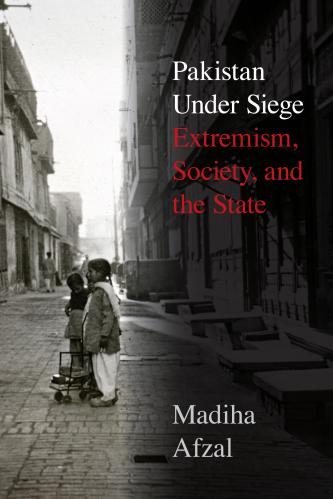
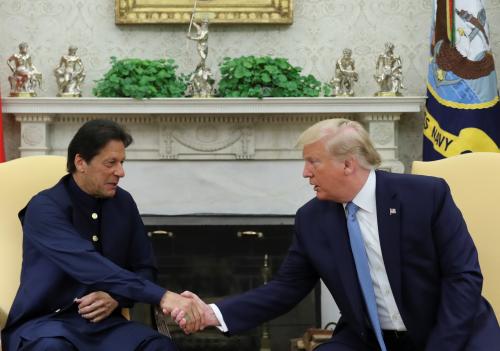

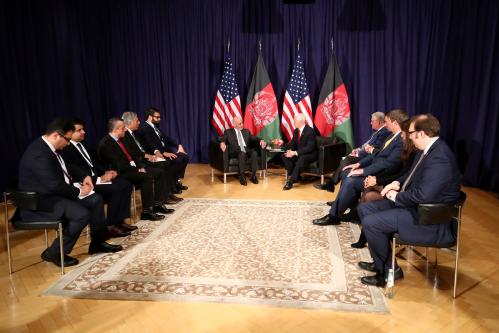

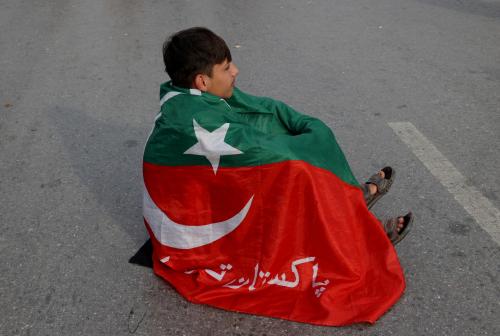
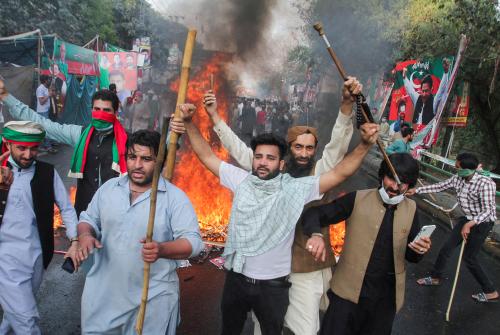
Commentary
Imran Khan’s incomplete narrative on the Taliban
October 14, 2019